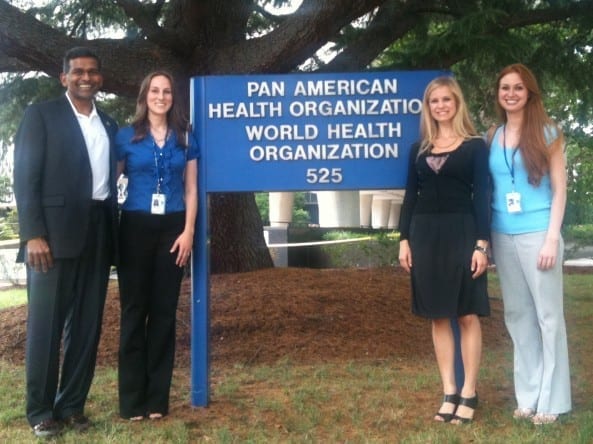Sarah McCool spent about a decade telling herself she wanted to be a lawyer. When she didn’t score well on the LSAT, she says, “I thought my life was over.”
Fortunately, fate led her to a secretarial job in a local hospital’s chemical dependency outpatient center, where she “fell in love with health care.” She took a full-time administrative position at the hospital, finished a master’s degree in health care administration and later enrolled in DMU’s master of public health program. A course on global health policy, she says, “was my ah-ha moment.” This summer, she was one of five DMU students to land internships with the World Health Organization (WHO).
Three of those students – McCool, public health program classmate Caitlin Molsberry and osteopathic medical student Hallie Lehman – interned at the Pan American Health Organization (PAHO), a WHO public health agency headquartered in Washington, DC, that works to improve health and living standards in the countries of North, Central and South Americas.

McCool worked on a comprehensive report, released every five years, that gives a detailed analysis of the health status of all PAHO member nations. Her name appears on the report’s second chapter, “Determinants of Health.” Even better, one of her supervisors asked her to return to PAHO next summer to work as a paid consultant.
“All these amazing things kept happening,” McCool says. “Thanks to DMU, I found my passion and profession.”
Molsberry wedged her PAHO internship in with her studies at DMU and a full-time position in the family health bureau of the Iowa Department of Public Health. She interviewed with PAHO while she was on a DMU health service trip in Honduras. At the agency, she wrote reports and did research, all of which she translated into Spanish. She was acknowledged as a technical contributor in a major PAHO publication, “Non-communicable Diseases in the Americas: Building a Healthier Future.”
“To be on the phone with someone in Belize, then in Trinidad and Tobago, then later meeting with someone from another country – most of the day, I was in a different culture,” Molsberry says. “It was strong affirmation that global public health is the right professional field for me.”
Meanwhile, osteopathic medical students Amy Borden and Roberto Fernandez bookended the human lifespan in their summer WHO internships in Geneva, Switzerland: Borden worked on projects in early child development and adolescent mental health, while Fernandez helped plan World Health Day 2012, which will focus on healthy aging.
“Aging cuts across all segments of society and sectors of the economy. Everyone is affected,” he says. He notes two major transitions occurring around the globe: the exponential rise in the number of adults over age 60, and the epidemiologic transition from infectious disease to more chronic or non-communicable diseases like cancer and diabetes.
“These two changes will transform the world as we know it, and governments need to prepare, plan and take action now,” he adds. “There is only a short window of opportunity. The current systems around the world – health care, social, etc. – are inadequate.”
All five students agree their summer internships will help them plan their own career paths.
“Working for WHO solidified and refined my passions and interests,” Borden says. “No matter where I end up, I now have a broader view of health and how health policy works on an international level. I am now more prepared and feel more capable of affecting change when I encounter a need or injustice in my future work.”

